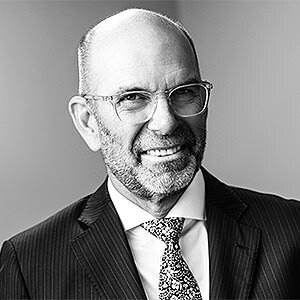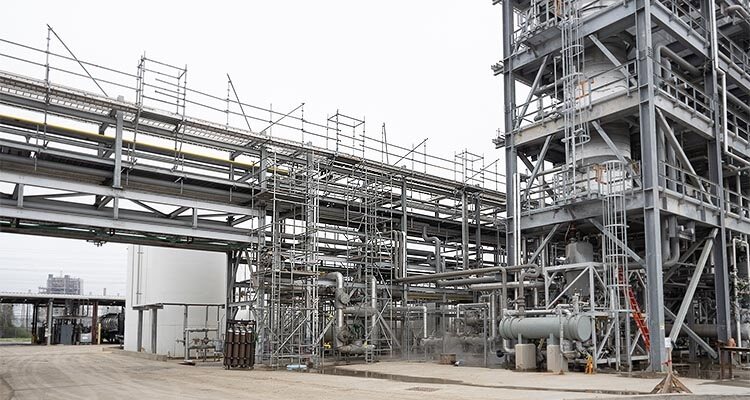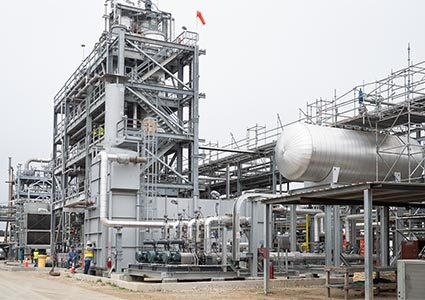Mark Bouldin, CEO of Blue Tide Environmental answers ten questions for Energy, Oil & Gas
1: Can you sum up Blue Tide Environmental and its operations in your own words?
Blue Tide Environmental is a Texas-based company dedicated to offering environmentally conscious solutions to finished lubricant producers. We specialize in providing low-carbon intensity base oils that not only meet but exceed current performance specification standards. This commitment means that we deliver some of the market’s most superior and consistent products, maintaining high quality throughout.
2: Tell us about your career history, and how you got involved in the world of sustainable oil?

Throughout the early stages of my career, I worked in various areas of the downstream business, predominantly focusing on base oils, finished lubricants, and asphalts, encompassing technical, sales, and management roles. Over the past decade, my trajectory has shifted towards the realm of used motor oil, re-refining, and environmental services.
During this period, I assumed pivotal roles such as President of SafetyKleen’s oil business, later leading GFL’s US liquid waste business, and serving currently as the CEO of Blue Tide Environmental since its inception in the spring of 2021. Blue Tide Environmental was established with the support of Tailwater Capital.
My academic background includes a Master’s in Chemical Engineering from Braunschweig, Germany, followed by a PhD in Chemical Engineering from the University of Hamburg. Subsequently, in 1988 I made the pivotal decision to immigrate to the United States, where I joined Shell in Houston, Texas.
3: Can you give some more details around your current role at Blue Tide Environmental – what might a typical day look like and what sorts of projects are you working on?
As the CEO of Blue Tide Environmental, my primary focus is on the successful completion of our used motor oil (UMO) re-refinery in Baytown, Texas. In late 2023, we initiated operations with the startup of the frontend vacuum system, resulting in the production of on-spec vacuum gas oil (VGO) for the hydrotreater. This crucial phase sets the stage for the hydrotreater to come online by mid 2024.
Furthermore, we are actively engaged in establishing a robust UMO supply network to sustain the plant’s operations. Concurrently, we are navigating the process of obtaining API approval for our base oils while forging partnerships with potential customers to secure contracts for our base oil volumes. This multifaceted approach underscores our commitment to operational excellence and strategic growth in the UMO re-refining sector.
4: Which part of your role do you enjoy most and why?
Being involved in the construction of a refinery of our magnitude in North America is a rare opportunity and one that I cherish deeply. It’s incredibly fulfilling to contribute to a project that not only advances our company’s objectives but also provides our customers with a groundbreaking environmentally responsible option for their finished lubricants in the region. Witnessing the progress of this endeavor and knowing the positive impact it will have on our customers and the environment is immensely gratifying.
Moreover, as we approach the operational phase of the plant, I eagerly anticipate the opportunity to shift focus towards optimizing our business operations. The prospect of driving profitability, expanding our presence both locally and geographically, and further cementing our position as leaders in sustainable solutions is truly exciting. I find great satisfaction in the strategic planning and execution involved in this phase, as it allows us to realize the full potential of our efforts and investments.
5: Can you give some more details about the base oils refinery in Baytown – I believe you recently completed your first phase there?
We successfully concluded the first phase of our UMO-to-base oil re-refinery project in Baytown, involving the vacuum distillation combined with a thorough clean-up of used motor oil (UMO) to yield high-quality vacuum gas oil (VGO) by late December. Presently, our dedicated project teams are diligently advancing towards completing the remaining backend of the re-refinery, specifically the hydrotreater, which transforms the VGO into a premium group II+ base oil. Anticipated to exceed a production rate of 4500 barrels per day (bpd), the hydrotreater represents a pivotal aspect of our operations. We are on track to commence base oil sales by late Q2 or early Q3 2024.
6: What is your long-term vision for Blue Tide Environmental – where do you see the business in the next five and ten years?
Our vision for Blue Tide Environmental is to solidify our position as a leading force in the industry, leveraging both organic growth from our Baytown, Texas re-refinery and new greenfield projects. Additionally, we aim to explore expansion opportunities through strategic acquisitions. With Shell as a minority shareholder, we benefit from access to a key player in finished lubricants production, facilitating the acceleration of our growth ambitions. Over the next five to ten years, we envision Blue Tide Environmental as a trailblazer in environmentally responsible solutions, continually expanding our presence and making a significant impact in the market.
 7: Looking ahead but more generally, with your expertise, what do you think is next for the oil sector?
7: Looking ahead but more generally, with your expertise, what do you think is next for the oil sector?
It’s evident that the oil sector is poised for significant changes. Globally, we anticipate an increase in demand for re-refined base oil (RBO), driven by governmental regulations and external pressures placed on companies to adopt more sustainable practices. Currently, many regions lack sophisticated re-refineries or a comprehensive collection and re-refining infrastructure, leading to a gap in the market for high-quality base oils.
As a result, we foresee a surge in demand for both re-refining expertise and RBO. Companies will need to adapt to meet these evolving market dynamics, embracing sustainable solutions to remain competitive. This shift represents a significant opportunity for innovation and growth within the oil sector, paving the way for a more environmentally responsible future.
8: I see from your website that your core values are critical to your operation – can you tell us more about those?
Values are the cornerstone of a company’s success, serving as the guiding principles that shape our actions and provide a framework for ethical behavior. They serve as benchmarks against which employees can measure their conduct. Therefore, we place significant emphasis on understanding and upholding the principles we have established.
In our hydrocarbon business, prioritizing Health, Safety & Environment (HSE) is paramount. At Blue Tide Environmental, safety is always our top priority, and we are unwavering in our commitment to ensuring that every employee and contractor returns safely home to their families every night. We cultivate a culture of respect among our employees, underpinned by a meritocratic approach that drives excellence in all that we do.
As an environmental firm, we are dedicated to upholding integrity, exceeding regulatory standards, and serving as responsible stewards of the planet. This commitment necessitates transparency and a willingness to embrace new ideas, even if they challenge the status quo.
Finally, we strive to instill a sense of ownership in every employee. We view our work not merely as a job, but as a mission to contribute positively to the world while also building a profitable business for our shareholders.
9: If there was one critical message, you’d like a reader to take from this piece, what would it be?
In contrast to typical hydrocarbon downstream businesses that primarily produce fuels for consumption, our focus lies in providing finished lubricant producers with a sustainable avenue to markedly reduce their carbon footprint while simultaneously improving product quality. Our solutions are designed to be environmentally friendly and economically viable, operating independently of governmental subsidies.
10: Are there any other areas that you consider important for the sector?
Governments can play a crucial role by implementing regulations that prohibit the burning of used motor oil (UMO), mandating the utilization of cleaner fuel alternatives. This approach preserves UMO as a vital component in a near-perfect recycling system. Conversely, the adoption of bio-derived lubricants, though motivated by noble intentions, can significantly impede the recyclability of UMO. Vegetable oils, being triglycerides rather than hydrocarbons, have the propensity to disrupt the recycling process by causing fouling in re-refineries above a critical concentration.

 7: Looking ahead but more generally, with your expertise, what do you think is next for the oil sector?
7: Looking ahead but more generally, with your expertise, what do you think is next for the oil sector?